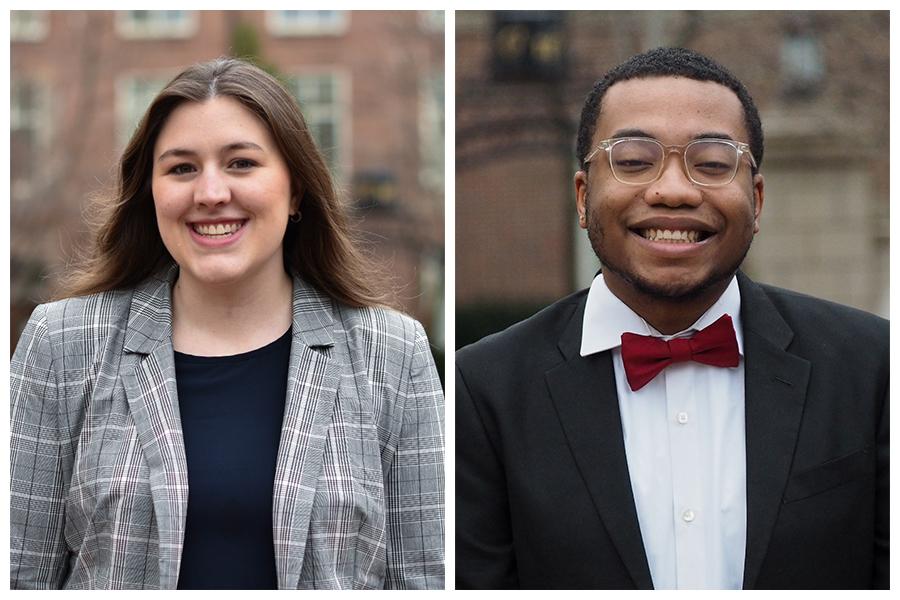The Student Association’s newly set top two leaders said they plan to spend the remainder of the term working to increase students’ awareness of mental health resources.
SA President Brandon Hill, who assumed the role in January, and SA Executive Vice President Catherine Morris, who was confirmed to the role last month, said they hope to add more positions to SA programs that aid students’ mental health, like GW Listens and the Student Advocacy and Support Corps. The duo said they want to use the remainder of the term to ensure students are aware of programs in the Colonial Health Center and through the SA that can help them weather the mental health impact of the pandemic.
Hill stepped into the position during a turbulent time – former SA President Howard Brookins resigned in late January after sexual misconduct allegations came to light and dozens of student leaders called for him to leave.
Hill said moving forward, he hopes to implement projects he started as executive vice president, like creating a financial aid advisory council and updating the syllabus bank. He said in ascending to his role, he realized the past SA president “poorly supported” programs like GW Listens, the Student Advocacy Corps and People for Periods – a program that provides menstrual products in campus bathrooms.
“We’re, one, trying to navigate this post-COVID world and what that looks like as well as propping up some of the areas where we’ve lacked,” Hill said. “That can be the lack of support that has been granted to survivors recently. That can be the lack of support granted to our internal programs.”
He added that he wants to add more positions in internal SA programs – like GW Listens, a student-run mental health hotline that he said has seen a more than 90 percent decrease in use since the pandemic began – to expand their resources and attention. He said he is communicating with officials in the Office of Advocacy & Support to provide mental health training for students who work on the hotline and increase the number of students working for the program to a “manageable amount.”
He said he plans to spend time toward the end of the semester “reimagining” the Student Advocacy and Support Corps, an SA program that offers guidance to students who have violated the Code of Student Conduct. He said he plans to implement a “big push” in May and June to hire new students and provide academic integrity training for those in the program.
Students currently undergo roughly a three-month training with SA leaders and officials where advocates learn about topics surrounding the academic code of conduct and GW’s disciplinary process.
“Those are some of the running themes throughout the remainder of our tenure, but we recognize that time is ticking and that we may not be in these roles for longer,” Hill said. “Whatever comes out of it is what we’re trying to get.”
Morris said since she began her role as executive vice president last month, she and Hill have met with Executive Vice President and Chief Financial Officer Mark Diaz to discuss expanding students’ access to the CHC’s physical and mental health resources, like increasing women’s services at the center. She said she plans to work with officials to research options to provide students free access to birth control and STD testing as well as possibly adding an OB/GYN doctor.
“We’ve had several conversations about that and have another one next week with people at the CHC and in the Office of Student Life to look at what changing some of that would look like,” Morris said.
Morris said she aims to increase students’ awareness about resources available to them, like premium Zoom and WebEx access, so they are not paying for resources GW already provided to them. She said she and Hill are working with the SA’s vice president for public affairs, Catherine Oriel, to create graphics for SA social media platforms to highlight various resources for students, like Zoom accounts, to academically help students.
“In addition to improving a lot of these systems, we really need to just get the information out there to students as to what’s currently existing and then improve along the way and update students with what that looks like,” Morris said.
Morris added that “trust issues” that arose in the SA recently after Brookins’ resignation are improving and said there has been a “mending process” in recent weeks between senators who had disagreements throughout the semester. She said tensions around the executive vice president nomination of SA Sen. Kate Carpenter, U-at-Large, also caused rifts between groups within the SA.
Senators denied Carpenter’s nomination last month after members of the senate held an almost hourlong private executive session to discuss her selection.
She said she has been trying to make herself “open and available” and have “candid conversations” with members of the senate who want to discuss any concerns within the SA. Morris said having open conversations with members in different branches can help avoid members being pinned against one another on potentially controversial topics.
“This is just not what people envisioned with their year in the SA, so I think getting over that and realizing everything that’s happened and moving forward is what’s happening now,” Morris said. “It will just take time for people.”








